Corporate Social Responsibility: How to Make Your Mark
If you’re a nonprofit professional trying to determine how corporate social responsibility applies to your organization, you’re in the right place! Corporate social responsibility can have a huge impact on not only your organization’s revenue, but also your relationships with companies.
In this guide, we’ll outline what exactly corporate social responsibility is, as well as how it directly impacts nonprofits.
Read along with us from the top or use the below navigation to find the sections that most interest you:
- Corporate Social Responsibility FAQs
- Types of Corporate Social Responsibility
- Top Types of Corporate Philanthropy
- Top 3 CSR Examples
- Ways Your Nonprofit Should Engage with CSR Departments
- Learn More About Double the Donation and 360MatchPro
What is Corporate Social Responsibility?
Corporate social responsibility (CSR) refers to a company’s attitude and efforts toward improving society. CSR helps companies be socially accountable through a variety of avenues, including philanthropic practices, economic factors, and environmental awareness. CSR can look vastly different for different businesses. For example, look at these hypothetical applications of a socially responsible mindset in a corporate setting:
- Pledging to reduce energy consumption by installing eco-friendly lights in the office
- Empowering employees to make a bigger impact on causes they care about by matching their charitable contributions
- Sponsoring nonprofits or hosting charity events on behalf of a nonprofit
- Investing in employee wellness and equity programs
These are just a few ideas that companies can integrate into their own practices, and we’ll go over more opportunities later.
Why is corporate social responsibility important for nonprofits?
CSR is important because it impacts more than just companies. It impacts employees of those companies, nonprofits, and the greater community.
According to Double the Donation’s recent statistics:
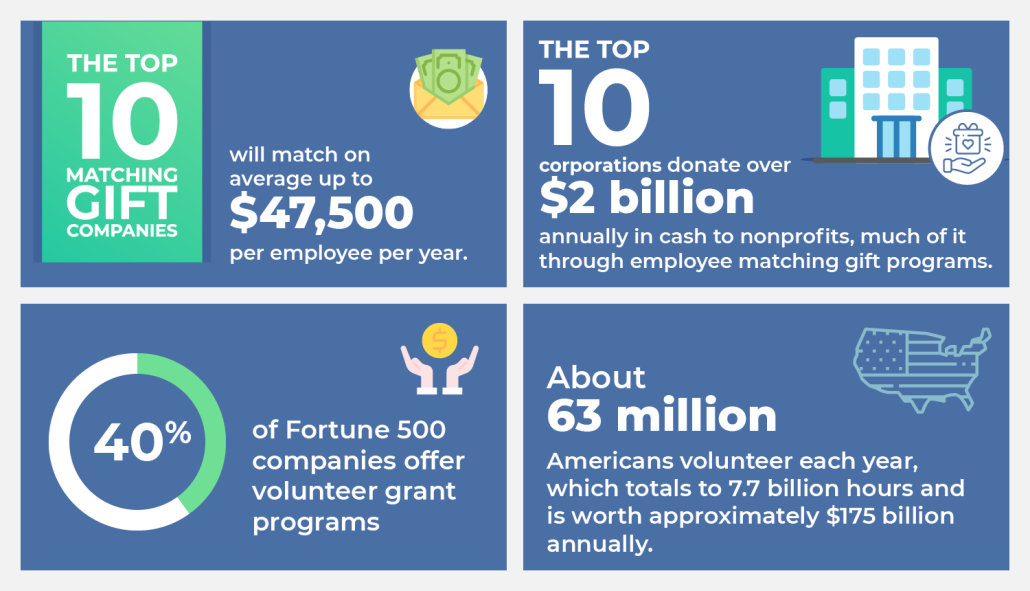
- The top 10 matching gift companies will match on average up to $47,500 per employee per year.
- The top 10 corporations donate over $2 billion annually in cash to nonprofits, much of it through employee matching gift programs.
- 40% of Fortune 500 companies offer volunteer grant programs.
- About 63 million Americans volunteer each year, which totals to 7.7 billion hours and is worth approximately $175 billion annually.
What are the benefits of corporate social responsibility?
CSR comes with many benefits. Businesses can give back to the community and build a positive image around their company brand, and nonprofits can continue working toward their missions with extra support from these companies. Here are some benefits broken up by type of organization:
Benefits of CSR for corporations:
- Employee engagement. Employees enjoy working for companies that take part in CSR because of the positive public image that results. When an employee’s company is constantly in the media for good reasons, they will be more engaged in their roles and proud of their company’s CSR. Employees also feel valued when companies support the organizations they care about.
- Community impact. Society as a whole can also benefit from CSR. Companies that are mindful of the impact they can make socially, environmentally, and economically will be able to help improve society.
- Improved reputation. When companies take part in CSR, consumers are more likely to want to work with them or purchase their products or services. Companies that offer this kind of positive social value will be more successful and form stronger relationships within their communities.
- Enhanced talent acquisition. Not only does CSR impact existing employees, but it can also help companies recruit talented new team members. For instance, a company that’s lauded for its DEI initiatives will likely attract a more inventive crop of potential hires who can improve the company with their own diverse experiences.
- More chances for innovation. When corporations embrace CSR, they often need to overhaul how they’re currently operating and come up with new ideas. Encouraging team members to be part of the change by suggesting improvements can help spark creativity, efficiency, and proactivity in the workplace. Not to mention, this signals to employees that their voices are valued.
Benefits of CSR for nonprofits
- Access to mission-critical funds. Nonprofits are consistently working toward a mission that targets the greater good. When CSR programs provide them with grants, matching gifts, and other forms of support beyond individual donors, nonprofits have more resources to perform important tasks.
- Increased exposure. Partnering with a corporation is a great marketing opportunity for nonprofits to reach the company’s customers and other stakeholders. Plus, nonprofits will experience the benefits of social proof when the corporation’s customers see that they’re supporting a cause and feel inclined to support it too.
- Capacity-building. Corporations can provide much more than funds to support nonprofits. They can also provide time and resources to help expand the nonprofit partner’s bandwidth, such as pro-bono services or event venues.
- Expanded networking opportunities. As part of a partnership with a corporation, nonprofits can access more chances to build relationships in the corporate space and the community at large, which can lead to funding opportunities in the future.
- Normalization of philanthropy. Many people want to help the world, but they might not know how or where to start. Corporate giving partnerships with nonprofits provide an easy way for workers to make an impact through a familiar organization: their employer.
What are the key components of a company’s CSR strategy?
Every company has its own focus and business objectives, so each strategy will be different. However, every company’s CSR program should contain these basic elements:
- Partner alignment. If a company decides to partner up with a nonprofit, ensure that both organizations have similar views and complement each other. For instance, an oil company would not be a good fit for an environmental nonprofit, while a pet store would be a great partner for an animal shelter. Companies should confirm that their suppliers and other business partners adhere to ethical standards as well.
- Stakeholder engagement. In order for CSR programs to work, all of a company’s stakeholders should be involved. For instance, employees might be more involved as representatives of the company, whereas customers might simply choose a company over a competitor because of its CSR efforts. Regardless of the level of involvement, companies should try to engage all types of stakeholders as they can all contribute to their efforts.
- Employee welfare and development. While CSR is usually thought of as supporting external charities, it’s important for companies to commit to internal improvements to help employees feel motivated. For instance, companies should implement Diversity, Equity, and Inclusion (DEI) practices into their culture to ensure that everyone has an equal chance to get jobs, advance in their careers, and feel welcome in the workplace.
- Performance metrics. Companies must establish clear metrics to evaluate performance to confirm that resources are efficiently spent on CSR programs. Each program’s key performance indicators vary based on its focus, but some common metrics include employee satisfaction, return on investment, total donations, and new customers acquired.
Ultimately, a robust CSR strategy encompasses more than the monetary investments in the program. Taking a comprehensive approach of integrating stakeholders and intentionally choosing partners will lend authenticity to the program and increase its value for the business.
How can a company start its CSR journey?
Starting a CSR strategy can seem daunting, but it doesn’t have to be. Double the Donation suggests these steps that can be applicable to any type of CSR program:
- Set a budget, goals, and project timeline.
- Decide what the company will do to contribute to support the program’s goals.
- Determine employees’ roles and eligibility requirements.
- Invest in software solutions to facilitate program management, such as a CSR management program or a corporate volunteering tool.
- Create an internal guide that explains how to participate in the CSR program and spread awareness to employees.
Like any other program rollout, companies shouldn’t forget to monitor key performance metrics and adjust their CSR strategy appropriately.
Types of Corporate Social Responsibility
Philanthropic
A large part of CSR consists of corporate philanthropy. Corporate philanthropy is the act of a company promoting the welfare of others, usually through charitable donations of funds. This type of CSR serves humanity by donating time, money, or resources to different nonprofits with varying causes, such as human rights, disaster relief, and educational programs.
One of the main types of corporate philanthropy programs is matching gifts. Companies will encourage their employees to donate to nonprofits and then match their charitable donations at a certain ratio.
For example: Visa will match a maximum of $5,000 per employee at a 1:1 ratio.
Volunteerism
Volunteerism is another type of CSR in which companies encourage their employees to volunteer with nonprofits. This benefits both companies and nonprofits; employees will be seen volunteering with charitable causes, and nonprofits will receive valuable time and work at the same time.
In addition to the above, nonprofits can also obtain additional revenue from volunteer grants. Volunteer grants are monetary donations companies give to nonprofits where their employees regularly volunteer. Meanwhile, many companies provide additional paid time off, or VTO, for employees to participate in volunteer activities during work hours—thus incentivizing higher rates of engagement.
For example: Microsoft will provide a grant of $25 per every hour an employee volunteers as well as up to 40 hours of VTO each year.
Environmental
Companies that participate in CSR are taking on more responsibilities than just providing resources to nonprofits. CSR helps many companies fulfill their environmental responsibilities, as well.
This includes reducing air, land, and water pollution. When companies take the lead on such initiatives, this improves their public image, but also helps the greater community by working to improve environmental conditions everywhere.
For example: Intel estimates that their water conservation efforts have saved about 44 billion gallons of water over the past decade, which is enough to sustain more than 400,000 U.S. homes for one year.
Ethical
Companies also have a responsibility to their own employees. CSR encourages companies to look after the welfare of their employees. This includes practicing fair labor, not discriminating among employees, providing equal pay for equal work, and offering a better living wage.
When companies commit to this type of CSR, their employees will be happier and more productive as a result. A healthy work environment goes a long way to benefit companies.
For example: According to Sony Corporation, “The Sony Group Code of Conduct anchors the ethics and compliance program. It establishes Sony’s standards for ethical and responsible business conduct, core ethical values and the basic policies on important topics.” Sony has been recognized as one of the “2019 World’s Most Ethical Companies” by the Ethisphere Institute.
Economic
Companies also have an economic responsibility. In terms of CSR, economic factors refer to the balance between business, environmental, and philanthropic practices. Companies orchestrate their business growth and generate profits by helping the greater community.
This means CSR companies are paying their taxes, investing in their communities, and paying it forward for the greater social good.
For example: According to Intel’s recent CSR report, they invest in education and digital skills training to help communities and countries advance their economic development and improve their competitiveness.
Top Types of Corporate Philanthropy
#1: Matching Gifts

Matching gifts are one of the most common CSR programs for companies. Essentially, companies will match the donations their employees make to nonprofit organizations at a specific ratio, usually 1:1 (though many companies match at a higher ratio, such as 2:1 or even 3:1!).
Impact of Matching Gifts
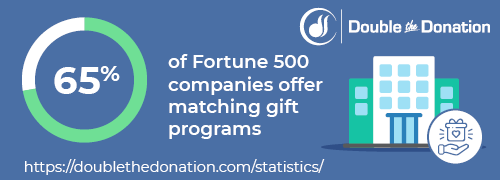
This CSR program can have a huge impact. For example:
- 65% of Fortune 500 companies offer matching gift programs.
- Over 18 million individuals work for companies with matching gift programs.
- 12% of total corporate cash contributions to nonprofits are made through matching gift programs. Corporations donated a total of $23.8 billion to nonprofits in 2018.
Raising More Through CSR

Your organization can raise more through CSR by leveraging a matching gift database, such as 360MatchPro by Double the Donation. This database automates much of the process surrounding matching gift submissions, reducing the effort needed from your team.
Takeaway: The more awareness there is surrounding matching gifts, the more nonprofits can receive from CSR companies.
#2: Volunteer Grants

Volunteer grants are another impactful form of CSR programs for companies. When a company’s employees regularly volunteer at a nonprofit, they can submit a request for a volunteer grant from their employer. Companies generally have guidelines, such as a minimum number of volunteer hours to be met or types of eligible organizations, before they issue a check to the nonprofit.
Impact of Volunteer Grants
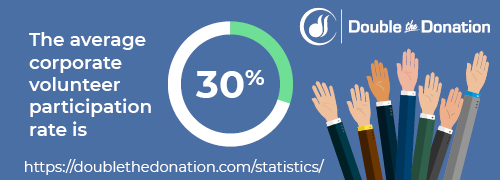
Volunteer grants are frequently overlooked forms of CSR, but can make a huge difference for nonprofits. For example:
- 40% of Fortune 500 companies offer volunteer grant programs.
- 80% of companies with volunteer grant programs provide between $8-$15 per hour volunteered.
- The average corporate volunteer participation rate is 30%.
Raising More Through CSR
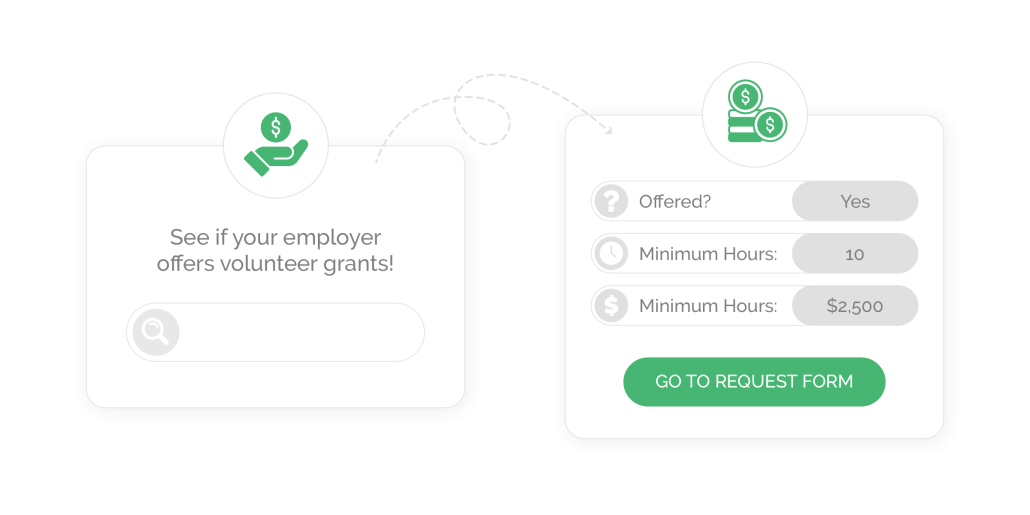
Your organization can raise more through CSR by leveraging a CSR database, such as 360MatchPro by Double the Donation. This database automates much of the process surrounding volunteer grant submissions, helping your supporters easily determine whether their company offers such grants.
Takeaway: Volunteerism is growing, which is why companies that take part in CSR initiatives can help nonprofits work toward their mission with extra helping hands and resources.
Learn more about volunteer grants!
#3: Sponsorships
Corporate sponsorships are an additional way for corporations to support nonprofits, both for fundraising and awareness purposes. Corporations team up with likeminded nonprofits to provide support for their mission, whether it’s providing computers for the nonprofit’s office, launching a matching donation challenge, or simply donating to the cause.

Impact of Sponsorships
Sponsorships are mutually beneficial for both nonprofits and corporations. According to Double the Donation, these are the biggest corporate sponsors:
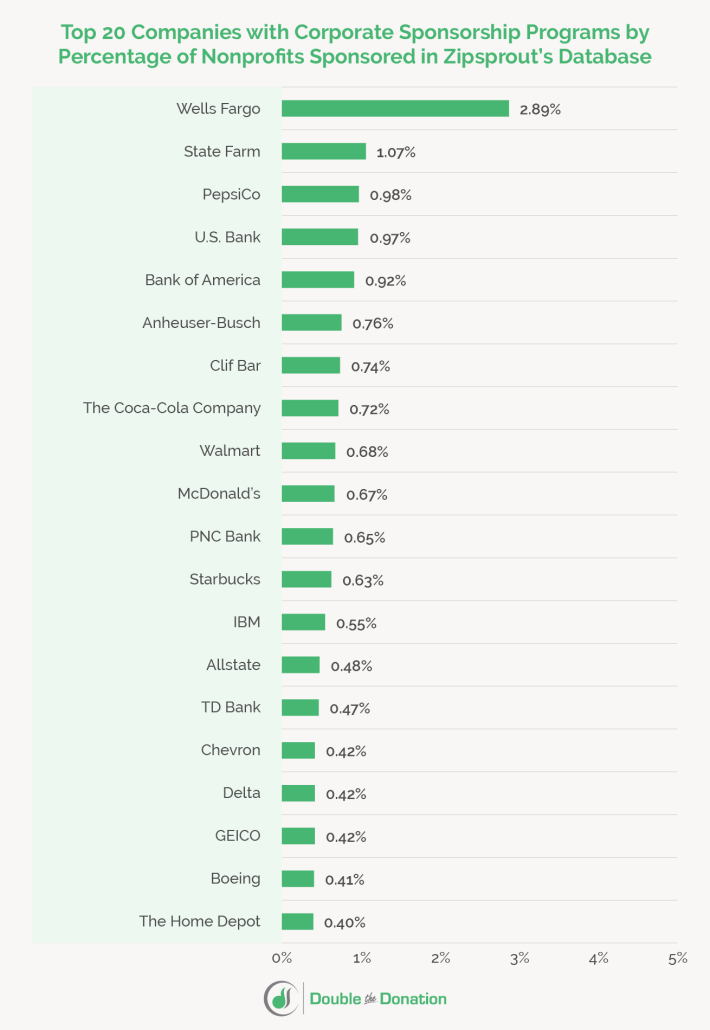
- Wells Fargo comes out on top, sponsoring nearly 3% of the nonprofits surveyed
- State Farm is in second place, sponsoring 1.07% of the nonprofits surveyed
- PepsiCo is in third place, sponsoring .98% of nonprofits surveyed
Raising More Through CSR
Nonprofits can leverage more sponsorships by using a reputable database of different companies’ CSR practices. Double the Donation’s comprehensive list of companies that give to nonprofits is a great place to start. Also, cover all of your bases by reaching out to local businesses for smaller sponsorship opportunities.
Takeaway: Sponsorships are a flexible way for nonprofits to raise more from corporations.
Learn more about corporate sponsorships here!
#4: Company-Wide Initiatives
Part of the reason why corporate partnerships work so well is that they have strength in numbers. If a corporation has a philanthropic partner that they donate significantly to, they can rally their employees to support them too with organized fundraising and volunteer campaigns. For example, take a look at some real employee volunteering and giving policies:
- Salesforce employees get seven paid volunteer days off per year
- Abercrombie & Fitch employees contribute to multiple nonprofit partners by contributing through the A&F Challenge fundraising event.
- Verizon employees can organize team volunteer efforts, and the company has a goal of volunteering a collective 2.5 million hours.
Raising More Through CSR
The best thing your nonprofit can do to push the needle and get companies to support you is to create custom pitches for each prospect. Remember to focus on quality over quantity; research your prospects and spend more time fine-tuning your pitch and building relationships with them.
Takeaway: Company-wide initiatives are an ideal way to harness the passion of many employees for a cause.
Top CSR Companies
Disney
Disney is a multinational mass media and entertainment conglomerate. Over the years, the company has taken a number of initiatives in their CSR strategy.
According to their most recent CSR report, Disney has taken strides to reduce their greenhouse gas emissions, minimize waste, and conserve water resources. They also offer competitive pay to their employees, health and wellness benefits, and family support, and promote diversity and inclusion.
Disney will match a maximum of $25,000 in donations per employee per year at a 1:1 ratio. Last year, Disney gave $338.2 million in charitable contributions.
Learn more about Disney’s matching gift and volunteer grant programs.
Microsoft
Microsoft is a multinational technology company that manufactures, licenses, supports, and sells computer software, consumer electronics, personal computers, and more. Overall, Microsoft has some excellent CSR program examples.
According to their CSR initiative, Microsoft has committed to helping reduce operational emissions by 2030. The company has also committed to ensuring their suppliers are socially, environmentally, legally, and ethically responsible, and that those who work for them are treated fairly.
This CSR company matches up to $15,000 in donations per employee per year at a 1:1 ratio.
Microsoft states they are committed to supporting their employees’ wellness and safety, and also strives to bring resources to underserved communities all around the world.
Learn more about Microsoft’s matching gift and volunteer grant programs.
Google is a technology company that specializes in Internet services, including its search engine, software, hardware, and online advertising technologies. Google is a top CSR company largely due to its 5-year goal to award $1 billion in grants and contribute 1 million employee volunteer hours.
According to Google, the company strives to combine funding, innovation, and technical expertise to support underserved communities and help solve the challenges these communities face each and every day. This includes humanitarian relief, data tracking for disease spread, and more.
Google supports organizations that address social and environmental challenges. For every hour an employee volunteers with an eligible organization, Google will provide a $10 grant to the nonprofit. What’s more, they’ll match their employees’ donations up to $10,000 dollars.
They also offer Google for Nonprofits, a program that provides free and discounted access to their premium productivity and communication tools. With an account, you can apply for their Google Ad Grants program, which awards eligible nonprofits $10,000 in advertising money each month. We recommend working with a Google Ad Grants agency such as Getting Attention to apply for the program and create ads that connect you with motivated prospects via Google Search.
Get a free consultation with Getting Attention to chat about Google Ad Grants.
Learn more about top CSR companies!
7 Ways Your Nonprofit Should Engage with CSR Departments
Companies all over are taking the initiative to get involved in CSR, and many of them have specific departments devoted to developing a corporate social responsibility plan.
So how can your nonprofit successfully engage with these departments?
It’s important to keep your organization’s mission and values at the forefront of your mind when reaching out to companies. That’s why we’ve outlined our top 7 strategies to get you started:
- Identify your niche. Before reaching out to companies, create a list of the social issues and constituents your organization addresses and supports. Identify how these areas of your organization would benefit from additional help.
- Start researching companies. Identify companies, local or national, that relate to your organization’s mission. Determine which companies may connect most with your cause. From there, take a look at their past corporate giving history. All of this will help you find the companies that are most likely to be responsive.
- Choose wisely. From your list, start narrowing down the companies to ensure your partnership is compatible. This means avoiding controversial companies that can damage your organization’s reputation.
- Reach out. Start reaching out to your narrowed-down list of companies to learn more about their CSR initiatives.
- State your cause. Share the social issues and impact your organization makes on the greater community by creating a proposal and presenting a few optional ways the companies can provide support. This can include donation matching campaigns or sponsorships, but it can also mean in-kind donations or other non-monetary options. Focus on value. How will their participation benefit the company’s image? What impact will they be making?
- Offer additional assistance. Offer to take on administrative tasks (like writing social media and email templates), help out with an implementation plan, and assist with measuring outcomes. This will show your value to the company and create the foundation for a mutually beneficial relationship.
- Recognize the company. Be sure to recognize the company however they prefer to be acknowledged, whether this is by featuring their logo on your website or in event materials, or giving them a shoutout in other marketing communications.
- Turn to experts for help. Agencies can help you make the most of CSR opportunities. Let’s take Google Ad Grants for example. Partnering with a Google Grants agency means you’ll have an expert on your side to apply for the program, maintain eligibility, and keep your account in good standing.
Incorporating these strategies into your CSR outreach plan can drive better results for your organization, help you find the support you need, and build long-term relationships with companies that align with your mission.
Learn More About Double the Donation’s 360MatchPro
As much as CSR makes a difference in the greater community, it can be difficult as a nonprofit to find specific opportunities that will benefit you and your mission. This is especially true if you’re a larger organization or university.
This is where a matching gift and volunteer grant database comes into play. Because these are two of the most popular CSR programs, it should be easy for donors to find information about matching gifts and volunteer grants. A comprehensive database like Double the Donation’s can help your supporters find out if they work for a company that takes part in CSR programs. More than 8,500 organizations use Double the Donation’s database, and it covers more than 20,000 companies and subsidiaries!
Software for Nonprofits to Raise More Money from Matching Gifts and Volunteer Grants
If you’re part of an organization looking to increase its matching gift revenue, Double the Donation offers an embedded plugin for use on donation pages, confirmation pages, and other places on your website. This plugin offers direct access to the database’s company search tool, allowing your donors to search for their employer’s CSR program information.
Once a supporter has interacted with your organization, such as by submitting a donation, 360MatchPro by Double the Donation will automate the process to secure a matching gift (or volunteer grant for volunteers!).
Here’s how it works:
- Once a supporter makes a donation to your organization, 360MatchPro will automatically scan for information provided during the donation process, such as email domains or employer information, to determine match eligibility. The supporter can also manually search for their employer’s matching gift program in a company name search tool.
- If identified as match eligible, the platform will automatically trigger an email to the supporter with information about how to submit a match request to their company. If their eligibility is undetermined or they’re likely ineligible, they will receive instructions on how to double-check their eligibility.
- Once your supporter’s information has been collected, the platform will help you track matches through to completion, allowing you to form a stronger relationship with each supporter and stay updated on their match request.
Also, 360MatchPro offers a unique feature that can streamline the matching gift submission process even further. According to Double the Donation, auto-submission enables donors to have their requests sent straight to employers without taking any extra steps:

To learn more about auto-submission and what it means for nonprofits and corporations, watch our educational video:
A database like 360MatchPro can offer benefits for your team because:
- When your supporters can easily determine if their employers participate in corporate giving programs, they’ll be more likely to engage with your organization and you’ll improve your relationship with them.
- When it’s easier to find the information your supporters need about CSR, this will make them more likely to give to your organization and request a donation match on your behalf.
- When more supporters give to your organization, this will in turn boost your revenue and allow your organization to continue working toward its mission.
360MatchPro by Double the Donation also integrates with more than 50 of the leading online donation platforms, peer-to-peer fundraising platforms, and CRMs.

Having the right tools and resources to help promote CSR and boost your organization’s impact is incredibly important. Databases like Double the Donation and 360MatchPro can help you more effectively meet this challenge.
Additional CSR Resources
- Matching Gifts Guide. Matching gifts are a top CSR program that can benefit nonprofits. Learn how your organization can start automating your matching gift process!
- Corporate Giving Guide. Corporate giving is on the rise, so it’s important to understand the basics. Discover ways your organization can leverage this form of corporate philanthropy!
- Corporate Philanthropy Guide. Corporate philanthropy impacts both nonprofits and companies. Explore the ways your organization can benefit and start raising more!
- Google Ad Grants Guide. This CSR program is an incredible opportunity for nonprofits that you don’t want to overlook! Learn everything there is to know about Google Grants from the experts at Getting Attention.







